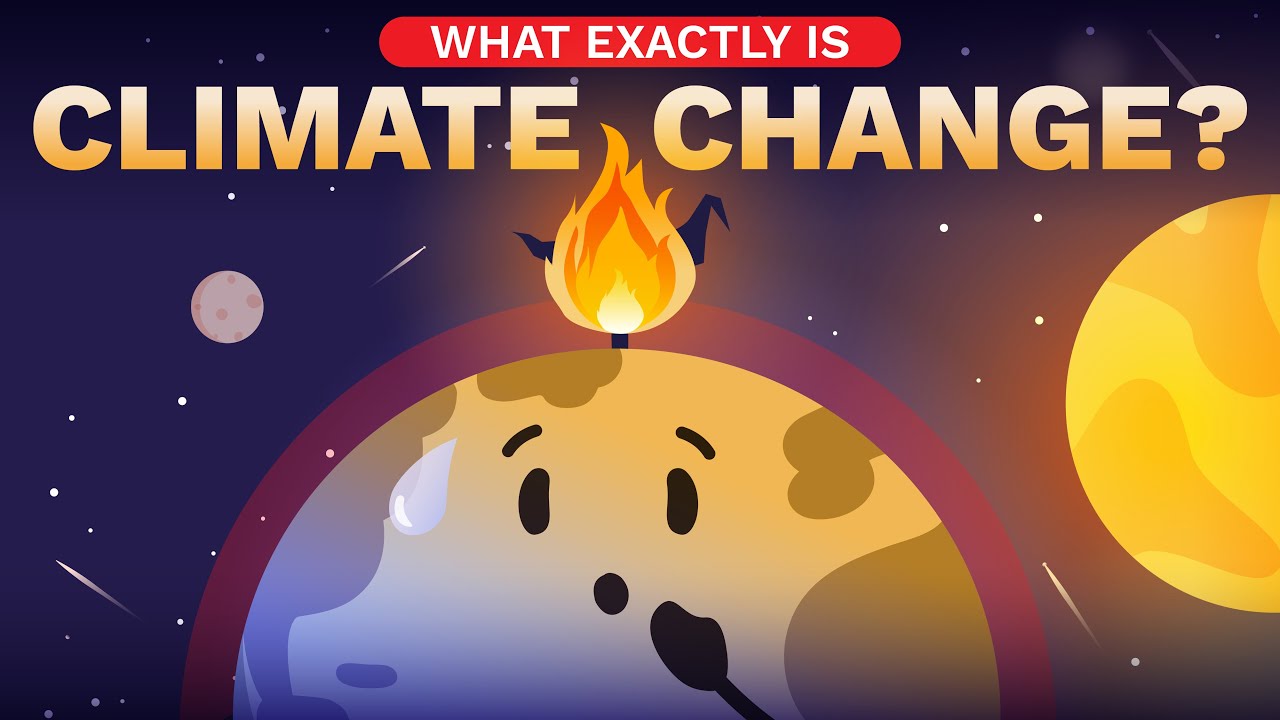Cutting Greenhouse Gas Emissions to Zero I NOVA I PBS
Summary
TLDRThe script addresses the urgent global climate crisis, emphasizing the need for mitigation to prevent further damage. It highlights the significant role of human activities, particularly fossil fuel combustion, in emitting greenhouse gases. The solution lies in transitioning to renewable energy sources like wind and solar, which are becoming more cost-effective and abundant. Innovations in energy distribution and storage are crucial to overcome the challenges posed by variable energy sources. The script also touches on the need for alternative fuels for sectors like aviation and the reduction of emissions from industrial processes, suggesting that while mitigation is vital, adaptation strategies may also be necessary to address the impacts of climate change.
Takeaways
- 🌍 We are in the early stages of a global climate crisis, but it's still possible to mitigate the damage.
- 🔥 Humans emit about 37 metric Giga tons of CO2 per year, which is a significant amount of greenhouse gas.
- 💡 To mitigate climate change, we need to reduce our net greenhouse gas emissions to zero.
- 🏠 Reducing energy consumption through efficient lighting, heating, and cooling can help lower emissions.
- 🌞 Renewable energy sources like wind and solar are becoming more affordable and accessible, making them a viable alternative to fossil fuels.
- 🌐 The challenge lies in creating an electric grid that can run on clean energy, managing the variability of renewable sources like wind and solar.
- 🚀 Transitioning sectors like aviation, which rely heavily on fossil fuels, to renewable energy sources will require significant innovation.
- 🏭 Industrial processes, such as cement production, also contribute to CO2 emissions and need to be addressed in climate mitigation efforts.
- 🌳 Methane, nitrous oxide, and other non-CO2 greenhouse gases account for about 25% of emissions, highlighting the need for a comprehensive approach to reducing all types of emissions.
- 🔄 While mitigation is crucial, adaptation strategies and solutions to undo or cope with the effects of climate change are also necessary, especially for populations already affected.
Q & A
What is the current global situation regarding the climate crisis?
-We are in the early stages of a global climate crisis, but it's still early enough that most scientists agree we can prevent a lot of damage if we stop creating the problem.
What does 'mitigation' in the context of climate change mean?
-In academic circles, mitigation refers to efforts to reduce greenhouse gas emissions to prevent further climate change.
How much CO2 do humans emit annually, and what does that equate to in terms of solid carbon?
-Humans emit about 37 metric Giga tons of CO2 per year. If all the carbon from that carbon dioxide were extracted and turned into solid coal, it would form a pile miles across and over a mile high.
What percentage of greenhouse gases come from the combustion of fossil fuels?
-The majority of greenhouse gases, about 70 percent, come from combusting fossil fuels for energy.
How can we reduce our reliance on fossil fuels for energy?
-We can reduce our reliance on fossil fuels by using less energy through measures like LED lighting and efficient heating and cooling systems, and by finding alternative, affordable, clean energy sources.
Why are renewables considered good alternatives to fossil fuels for energy production?
-Renewables are now the cheapest form of electricity on two-thirds of Earth's surface, and they are growing rapidly. They offer a sustainable and cleaner alternative to fossil fuels.
What are some of the challenges in creating an electric grid that runs on clean energy?
-Challenges include the difficulty in controlling the output of renewable sources like solar and wind, which are dependent on weather conditions, and the need for innovative ways to distribute and store energy.
How do renewable energy sources like wind and solar compare to nuclear and geothermal power in terms of carbon-free energy production?
-Wind and solar are much further ahead than nuclear and geothermal power in terms of growth and accessibility. However, nuclear and geothermal power also contribute to carbon-free energy production.
What is one of the sectors of the economy that might find it challenging to run on clean energy?
-The aviation sector, particularly long-haul flights, may find it challenging to run on clean energy due to the high energy density required for jet fuel.
What is the significance of the electric grid in the transition to clean energy?
-The electric grid is crucial for distributing clean energy to various sectors of the economy. Making the grid run on clean energy is a key step in reducing greenhouse gas emissions.
Besides energy production, what other sources contribute significantly to greenhouse gas emissions?
-Industrial processes, such as the production of cement, and other greenhouse gases like methane, nitrous oxide, and industrial refrigerants, contribute significantly to greenhouse gas emissions.
Why is it important to innovate in the field of energy storage and distribution when transitioning to clean energy?
-Innovation in energy storage and distribution is necessary to ensure a reliable and consistent supply of energy from sources like solar and wind, which are variable and dependent on weather conditions.
What are some of the potential solutions for adapting to or undoing the damage caused by climate change?
-While the script does not provide specific solutions, it suggests that in addition to mitigation efforts, we may need other solutions that help us adapt to or undo some of the damage caused by climate change.
Outlines

此内容仅限付费用户访问。 请升级后访问。
立即升级Mindmap

此内容仅限付费用户访问。 请升级后访问。
立即升级Keywords

此内容仅限付费用户访问。 请升级后访问。
立即升级Highlights

此内容仅限付费用户访问。 请升级后访问。
立即升级Transcripts

此内容仅限付费用户访问。 请升级后访问。
立即升级浏览更多相关视频

Climate Change: How does it really work? | ClimateScience #1

UN: Rising sea levels disaster for all: BBC Learning English from the News

An Emotional, Powerful Speech On Climate Change

Module-6: Climate has Changed!

Somalia President Hassan Sheikh Mohamud calls on effective inclusivity to tackle climate change

EFECTOS del CAMBIO CLIMÁTICO 🌏🔥 (5 Graves Consecuencias)
5.0 / 5 (0 votes)
